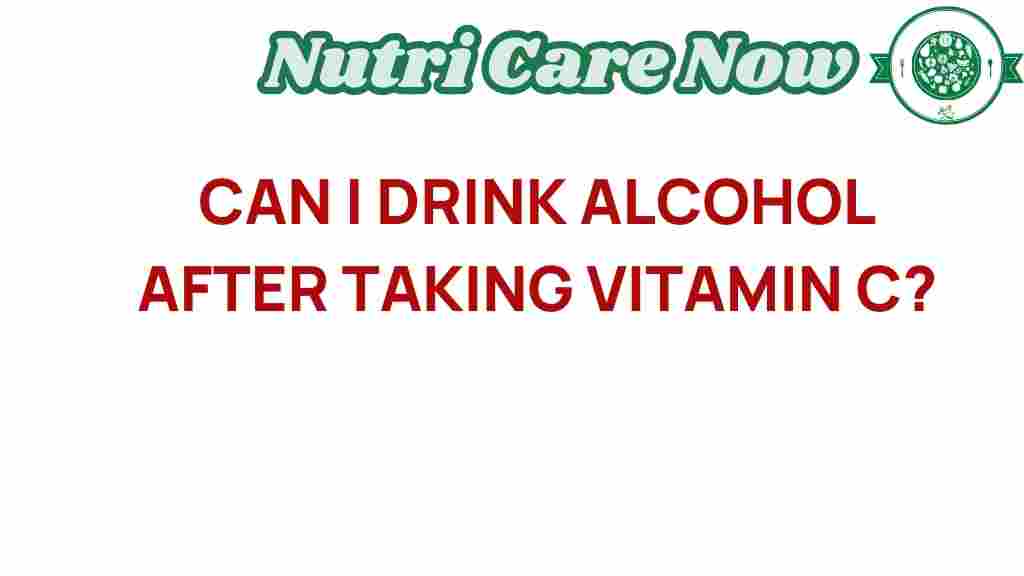The Surprising Effects of Alcohol on Vitamin C Absorption
When it comes to maintaining good health, the role of nutrients like vitamin C is paramount. As a powerful antioxidant, vitamin C protects our cells from damage and supports our immune system. However, many people overlook how lifestyle choices, particularly alcohol consumption, can influence nutrient absorption. In this article, we will explore the interaction between alcohol and vitamin C absorption, the implications for health and wellness, and practical tips to optimize your nutrient intake.
Understanding Vitamin C and Its Importance
Vitamin C, or ascorbic acid, is a water-soluble vitamin that plays a crucial role in various bodily functions:
- Boosts the immune system
- Promotes collagen production for healthy skin and tissues
- Enhances iron absorption from plant-based foods
- Acts as an antioxidant, protecting against free radicals
Given its numerous benefits, ensuring adequate vitamin C intake through a balanced diet is essential. Foods rich in vitamin C include:
- Citrus fruits (oranges, lemons, grapefruits)
- Kiwi
- Strawberries
- Bell peppers
- Broccoli
The Interaction Between Alcohol and Nutrient Absorption
Alcohol consumption can significantly affect the absorption of various nutrients, including vitamin C. Here are some ways in which alcohol impacts nutrient absorption:
- Impaired absorption: Alcohol can damage the lining of the gastrointestinal tract, making it difficult for the body to absorb nutrients effectively.
- Increased nutrient excretion: Alcohol can lead to increased excretion of certain nutrients through urine, further depleting the body’s stores.
- Altered metabolism: Alcohol affects the liver’s ability to metabolize nutrients, impacting how vitamins and minerals are processed in the body.
How Alcohol Affects Vitamin C Absorption
The relationship between alcohol and vitamin C absorption is particularly concerning for individuals who consume alcohol frequently. Here’s how alcohol specifically impacts vitamin C:
- Reduced intestinal absorption: Studies have shown that alcohol can reduce the efficiency of vitamin C absorption in the intestines, leading to lower serum levels of this critical nutrient.
- Increased oxidative stress: Alcohol consumption increases oxidative stress in the body, which may deplete vitamin C stores more rapidly as the body uses it to combat the effects of free radicals.
- Higher vitamin C requirements: Heavy drinkers may require more vitamin C to counteract the damaging effects of alcohol on the body.
Health Implications of Reduced Vitamin C Absorption
The consequences of impaired vitamin C absorption due to alcohol consumption can be serious. Here are some health implications to consider:
- Weakened immune function: A deficiency in vitamin C can lead to a compromised immune system, making the body more susceptible to infections.
- Skin issues: Insufficient vitamin C can result in poor collagen production, leading to skin problems such as dryness and premature aging.
- Increased fatigue: Vitamin C is essential for energy production, and low levels can contribute to feelings of fatigue and lethargy.
- Higher risk of chronic diseases: Chronic alcohol consumption and low vitamin C levels have been linked to an increased risk of diseases such as cardiovascular disease and certain cancers.
Optimizing Vitamin C Intake While Consuming Alcohol
If you choose to consume alcohol, there are ways to ensure you maintain adequate vitamin C levels:
1. Choose Vitamin C-Rich Foods
Incorporate foods high in vitamin C into your diet, especially when consuming alcohol. Consider snacking on:
- Oranges or orange juice
- Strawberries
- Bell pepper slices
- Broccoli
2. Consider Vitamin C Supplements
If you are a regular drinker, you might want to consider vitamin C supplements. Consult with a healthcare professional to determine the right dosage for your needs.
3. Stay Hydrated
Drinking water alongside alcoholic beverages can help mitigate some of the negative effects of alcohol on nutrient absorption. Aim for a balanced approach:
- For every alcoholic drink, try to drink a glass of water.
- Limit your alcohol consumption to moderate levels to minimize its impact on your overall health.
Troubleshooting Common Issues
If you’re experiencing fatigue, skin issues, or frequent illnesses, consider evaluating your alcohol consumption and vitamin C intake. Here are some troubleshooting tips:
- Keep a food diary: Track your alcohol intake and dietary habits to identify potential deficiencies.
- Consult a healthcare professional: If you’re concerned about your nutrient absorption or overall health, seeking guidance from a healthcare provider can help.
- Monitor your body: Pay attention to signs of vitamin C deficiency, such as gum bleeding, fatigue, and irritability.
Conclusion
The interaction between alcohol and vitamin C absorption is a crucial consideration for anyone looking to maintain optimal health. Understanding how alcohol affects nutrient absorption can help you make informed choices about your lifestyle. By incorporating vitamin C-rich foods, considering supplementation, and moderating alcohol consumption, you can support your overall wellness.
For more information on nutrient absorption and maintaining a healthy lifestyle, visit this resource. Remember, your health is in your hands – make choices that nourish and protect your body.
Incorporate these practices into your daily routine to ensure you’re getting the most out of your nutrients and supporting your health in the long run.
This article is in the category Health and created by NutriCareNow Team
